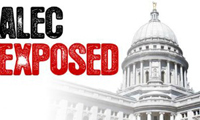By Eric Wesoff
GreenTech Meida
 Distributed renewable energy is a threat to fossil-fuel-based utilities and industries. The more clean energy consumers produce, the fewer assets utilities get to add and the less energy gets sold. It turns the utility model upside down.
Distributed renewable energy is a threat to fossil-fuel-based utilities and industries. The more clean energy consumers produce, the fewer assets utilities get to add and the less energy gets sold. It turns the utility model upside down.
It would be naive to think that these incumbent forces would not push back, hard, against renewable energy on the frontlines and in back rooms.
Look at ALEC, the American Legislative Exchange Council, to observe one way that entrenched interests are fighting back.
With almost 2,000 state legislators as members, ALEC describes itself as the “state legislators’ think tank” and “nonpartisan.” Despite its nonpartisan claim, the board is made up almost entirely of Republican and Tea Party-associated legislators.
ALEC produces “model bills” for its members to take back to their respective state houses. The issue is that ALEC is funded by firms such as Koch Industries and Exxon Mobil, according to tax documents acquired by Bloomberg News in legislation involving carbon pollution. Peabody Energy, the world’s largest private coal company, is an underwriter, as is Duke Energy, according to The Center for Media and Democracy.
ALEC opposes renewable portfolio standards (RPS) and suggests that free markets, rather than mandates, should steer the energy sector.
In addition to opposing RPS, ALEC blocks climate change legislation, and as reported in ALEC Exposed, has crafted legislation to block the EPA from regulating coal ash.











